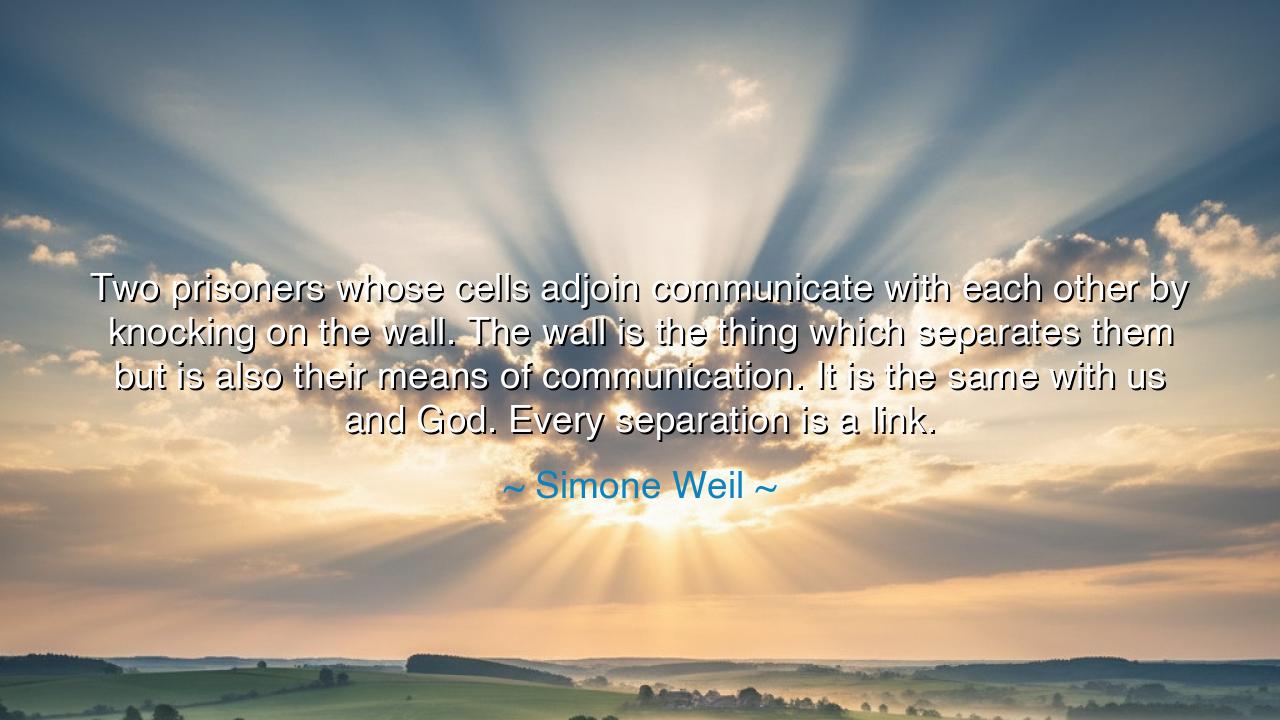
Two prisoners whose cells adjoin communicate with each other by
Two prisoners whose cells adjoin communicate with each other by knocking on the wall. The wall is the thing which separates them but is also their means of communication. It is the same with us and God. Every separation is a link.






Host: The room feels still, the soft glow of the lamp casting a warm, inviting light as the evening deepens. Outside, the world has quieted, and a peaceful hush fills the space. Jeeny sits on the couch, her legs curled beneath her, her fingers lightly tracing the rim of her tea cup. Jack, standing near the window, watches the darkened world outside, clearly lost in thought. The calm atmosphere feels like the perfect backdrop for a conversation about connection, separation, and understanding.
Jeeny: “Jack, I came across a quote today from Simone Weil that really resonated with me,” she says softly. “She said, ‘Two prisoners whose cells adjoin communicate with each other by knocking on the wall. The wall is the thing which separates them but is also their means of communication. It is the same with us and God. Every separation is a link.’ What do you think about that?”
Jack: He turns, his brow furrowing as he processes her words. “That’s a really powerful image. The idea that the wall, something that separates two people, is also the very thing that allows them to communicate. It’s like she’s saying that our separation from God, or from something we deeply desire, isn’t necessarily a barrier. In a way, it becomes a means of connection. It’s paradoxical, isn’t it?”
Jeeny: “Exactly. The wall becomes a link, a way to connect. Simone Weil is pointing out that separation, whether it’s from another person or from God, doesn’t just create a void — it also creates an opportunity for communication and connection. It’s in that space of distance or absence that we find ways to reach out, to yearn, to connect in deeper ways than we might if everything were right in front of us.”
Host: The light in the room deepens as the conversation unfolds, and the idea of separation transforming into a form of connection begins to resonate. Jeeny speaks with a quiet conviction, and Jack seems to reflect on the deeper truth that the absence of something or someone can sometimes open up new pathways for reaching out or understanding, even when it feels like a barrier.
Jack: “So, in a way, the separation isn’t just a loss; it’s also a space where we can reach beyond ourselves, a place where we can find new ways of communicating, of longing, and of growing. I think what Weil is saying is that separation itself doesn’t have to be a negative thing. It can be a space where we are called to connect in a different way, a way that wouldn’t exist without the separation.”
Jeeny: “Exactly. And it’s not just a human relationship. The idea of being separated from God, for instance, can sometimes feel like an empty space, but it can also be a profound opportunity for connection. It’s the yearning, the knocking on the wall, that creates a kind of movement toward something greater. Separation pushes us to reach for what is just beyond our grasp, to find deeper meanings, and sometimes, it’s in that very distance that we come closer.”
Host: The room feels quieter now, the weight of their words settling in as they reflect on the paradox of separation as a means of connection. Jeeny and Jack both seem to contemplate how absence, rather than just being a void, can be a catalyst for growth and communication. Simone Weil’s quote serves as a reminder that every separation, whether physical, emotional, or spiritual, has the potential to create new ways of reaching out, of connecting in ways we might never have imagined.
Jack: “It’s almost like longing and distance are part of the process of connecting. The desire to break through that wall, the knocking, the yearning for something more, is just as important as the closeness itself. Without that space, would the connection feel as deep? Maybe it’s the separation that makes the connection more meaningful.”
Jeeny: “Yes, it’s the space that gives the connection depth. If everything were always immediate, always close, we might lose the sense of how powerful the connection is. The yearning, the waiting, the distance — all of these add layers to the relationship, making it more complex and richer. It’s not the wall that separates us from God, or from each other, but the way we engage with that space that matters.”
Host: The silence in the room feels almost reverent now, as if the conversation has uncovered a deeper understanding of connection and separation. Jeeny and Jack sit together, reflecting on how separation isn’t necessarily a barrier, but a means of connecting in a deeper, more meaningful way. Simone Weil’s words serve as a reminder that sometimes, it is the distance that creates the opportunity for communication, growth, and understanding.






AAdministratorAdministrator
Welcome, honored guests. Please leave a comment, we will respond soon